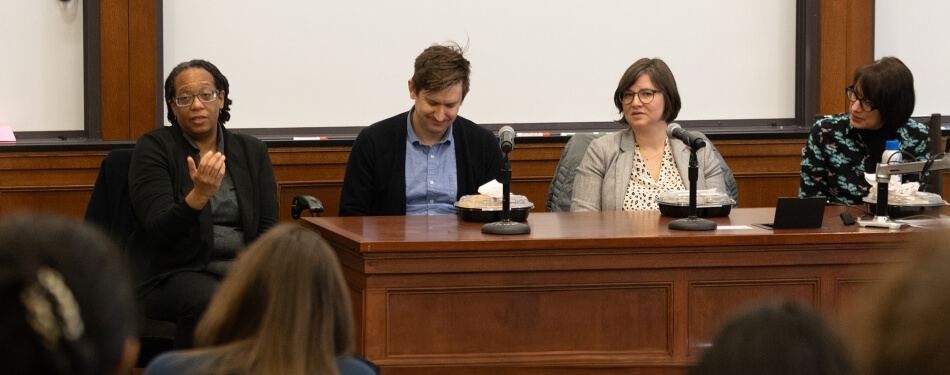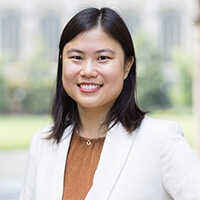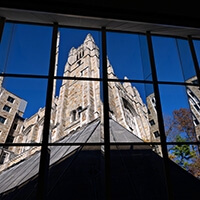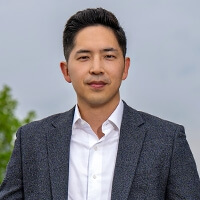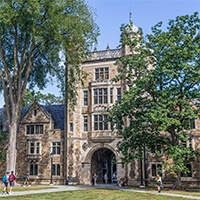During Michigan Law’s recent Public Interest Week, students, faculty, staff, and alumni came together to share stories, advice, and resources about navigating a complex but rewarding career path.
The majority of law students, not just at Michigan but nationwide, enter private practice after graduation. In her Public Interest Week Kickoff address, Molly Kovel, ’06, noted that’s no accident.
“The system makes it easy to work in Big Law; the path is well worn and clear, and the financial incentives are great,” she said.
“You probably know someone who thinks you’re crazy to not take that path.”
Kovel explained how as the child of activists, public interest work has always been in her blood. She grew up attending protests and as a college student was arrested for civil disobedience. Now, as a senior staff attorney at the ACLU’s Criminal Law Reform Project, she works on cases challenging unjust prosecution and policing practices. During her tenure as a senior staff attorney at the New York Civil Liberties Union, she was class counsel on a case challenging the NYPD’s stop and frisk policy.
She acknowledged that the pay discrepancy between public interest and private practice can be daunting and spoke frankly about how she and her husband balance financial pressures in order to live a comfortable life in an expensive city.
“It might not always be easy, but you will be fine,” Kovel said. “The people who will not be fine are the future clients who need you.
“There is a planet full of problems to solve, and that’s why you’re here.”
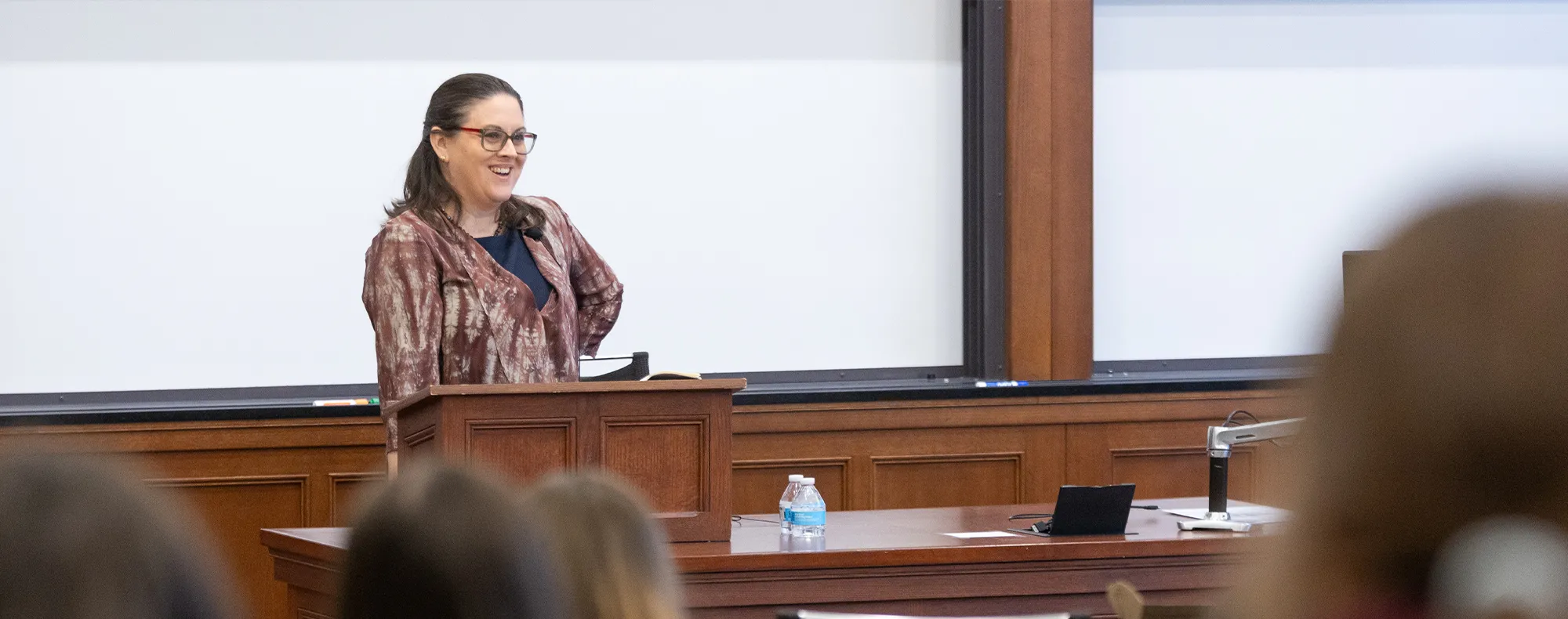
A unique commitment to public interest students
Roughly 18 percent of recent Michigan Law classes entered public interest positions and government service after graduation. Public Interest Week is part of a multifaceted approach to supporting and celebrating students who pursue those paths, said Emily Bretz, ’11, the Law School’s public interest director.
“Michigan Law is unique in its commitment to public interest students, and the public interest community here is truly special,” she said, noting that the Office of Career Planning and the Office of Student Life have counselors who specialize in public interest, in addition to faculty members who enthusiastically mentor students.
A robust slate of programs and talks throughout the semester, the annual fall kickoff party hosted at Professor Michael Steinberg’s house, and two community storytelling events, TA1Ls and The Valiant, help connect the community. In addition, the Organization of Public Interest Students is an active group that provides social connection and professional networking and development opportunities.
Unlike law schools in major cities that have greater access to legal services, Bretz noted that there is more of a need in Michigan for students to serve as clinical attorneys and do pro bono work in the community. Students with varying career aspirations participate in the Law School’s pro bono program; more than 200 students average approximately 8,000 hours of service each year.
The Pro Bono Fair—where students can engage with current projects—was the culminating event of Public Interest Week.
Through these experiential opportunities, “Not only are students actively helping people who need it, but they are gaining critical skills as future public interest lawyers. And then they apply those skills in public interest internships and externships across the country,” Bretz said.
Demonstrating how to be a public interest lawyer
Another strength of Michigan Law’s public interest community is its alumni.
“The passion and sheer quantity of Michigan Law alums (and, in particular, public interest alums) cannot be overstated,” Bretz said. “No matter your area of interest or geographical preference, there are alums doing that work and alums in that city who are thrilled to connect with and help public interest students.”
Three of them spoke to students at Wednesday’s panel, “How to Be a Public Interest Lawyer.”
From cursing out opposing counsel in the hallway (and apologizing later) to getting talked out of pursuing litigation because he lacked confidence in going up against heavy hitters, the alumni regaled students with tales of what they do, why they do it, and the lessons they’ve learned along the way.
“Sometimes I feel like I shouldn’t have to work so hard for things that are so obvious,” said Jessica Gingold, ’16, a senior staff attorney at Equip for Equality, an Illinois nonprofit that provides legal aid and policy advocacy for people with disabilities. Her work focuses on special education rights.
“Working with kids, the path forward is rarely a straight line. But it doesn’t need to be a straight line for there to be successes.”
Nick Leonard, ’14, executive director of the Great Lakes Environmental Law Center, joined the organization as an Equal Justice Works Fellow after graduation. He encouraged students to use their time in law school to explore not only career fields but types of work within that field—noting that even though he was interested in environmental law as a student, he disliked one of his environmental law internships because of the nature of the work.
The internship experience helped him realize he wanted to be client facing, working alongside community members as equal partners.
“I had a very specific vision for my career, and it was hard for me to find an employer that could give me the autonomy I wanted,” he said. “I ended up in a very small office where I had autonomy but not a lot of training or mentorship. I had to figure everything out on the fly, which was both a challenge and an opportunity.”
Kerene Moore, ’05, director of the Conviction Integrity and Expungement Unit in the Washtenaw County Prosecutor’s Office, said that as a Black queer woman, it was hard to relate to most legal professionals. She got into public interest law “because I wanted to work for vulnerable people who really needed help. I went to law school because I really care about helping people.”
Making a difference in ways big and small
From 2007 to 2019, Moore served as a supervising attorney with the Michigan Advocacy Program, part of Legal Services of South Central Michigan. Her practice included LGBTQ+ rights cases during a time that included the Obergefell v. Hodges ruling, in which the US Supreme Court upheld marriage equality.
“Seeing a landmark case through, and being able to litigate on behalf of people whose lives are directly impacted by such a ruling, is invigorating.”
Moments of seismic change like that ruling may feel few and far between, but they help show the possibilities beyond the barriers that public interest lawyers inevitably face, she told the students.
“Seeing a landmark case through, and being able to litigate on behalf of people whose lives are directly impacted by such a ruling, is invigorating.”
Kovel, who litigated against the NYPD, noted that for many years, criticizing the department in the wake of 9/11 would have been a non-starter.
“The fact that we have had such a broad national conversation about police misconduct, even though it has elicited some backlash, is proof that we’re making progress. You’re not always going to be building victory upon victory, but over time you can look back and see how far you’ve come.”
At the same time, though, not all wins make headlines. Kovel recalled spending a few minutes talking with a client about a form that he needed to fill out to help him find work despite his criminal conviction. It wasn’t her line of practice, but she knew enough that she could help him. He was so grateful, he sent her flowers.
“A simple conversation that seems like no big deal to you can make a huge difference for your client. Don’t ever forget that,” she said.

